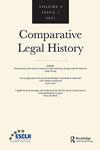不受欢迎的公民:第二次世界大战期间克罗地亚和罗马尼亚犹太人毁灭的“合法性”
IF 0.5
Q2 LAW
引用次数: 0
摘要
本文考察了第二次世界大战期间导致克罗地亚和罗马尼亚犹太人社区遭到破坏和消灭的法律框架的建立。它认为,这两个政权在国内法西斯意识形态的支持下,不断发展的反犹主义,并受到纳粹政权的启发,颁布了反犹法律规范,向其公民呈现和建立新的政治、意识形态和社会价值观和类别。本文采用了保罗·莫罗提出的规范理论框架,将规范视为实用的处方、许可或禁止。我们认为,这些破坏性的规范为法西斯主义新世界观和新现实中的个人提供了指导。因此,这些规范得到了国家的授权和实施,成为对不受欢迎的公民进行制度性破坏的“法律”基础。这给地方和国家行为者提供了迫害和谋杀犹太人的“合法”借口,剥夺了犹太人的权利、资产、财产和生命权。文章的结论是,这两个法律框架制定了使克罗地亚和罗马尼亚的犹太社区面临前所未有的破坏的过程,这证明了法律规范对个人的重要性和影响,无论他们是受害者、旁观者还是犯罪者。本文章由计算机程序翻译,如有差异,请以英文原文为准。
The unwanted citizens: The ‘Legality’ of Jewish destruction in Croatia and Romania during World War II
This article examines the establishment of the legal framework that led to the destruction and elimination of Jewish communities in Croatia and Romania during World War II. It argues that both regimes, supported by domestic fascist ideologies, evolving antisemitism, and inspired by the Nazi regime, promulgated anti-Jewish legal norms to present and establish new political, ideological, and social values and categories to their citizens. This article employs the theoretical framework of norms developed by Paul Morrow, whereby norms are seen as practical prescriptions, permissions or prohibitions. We argue that these destructive norms served as guidelines for individuals within the fascist new worldview and new reality. As such, these norms received state authorisation and implementation, serving as the ‘legal’ basis for the institutional destruction of unwanted citizens. This gave local and state actors a ‘legal’ pretext for the persecution and murder of Jews, who were stripped of their rights, assets, properties and right to life. The article concludes that the two legal frameworks enacted the process by which Jewish communities in Croatia and Romania faced a devastation of unseen proportions, which testifies to the importance and impact of legal norms on individuals, be they victims, bystanders or perpetrators.
求助全文
通过发布文献求助,成功后即可免费获取论文全文。
去求助
来源期刊
CiteScore
1.70
自引率
0.00%
发文量
20
期刊介绍:
Comparative Legal History is an international and comparative review of law and history. Articles will explore both ''internal'' legal history (doctrinal and disciplinary developments in the law) and ''external'' legal history (legal ideas and institutions in wider contexts). Rooted in the complexity of the various Western legal traditions worldwide, the journal will also investigate other laws and customs from around the globe. Comparisons may be either temporal or geographical and both legal and other law-like normative traditions will be considered. Scholarship on comparative and trans-national historiography, including trans-disciplinary approaches, is particularly welcome.

 求助内容:
求助内容: 应助结果提醒方式:
应助结果提醒方式:


